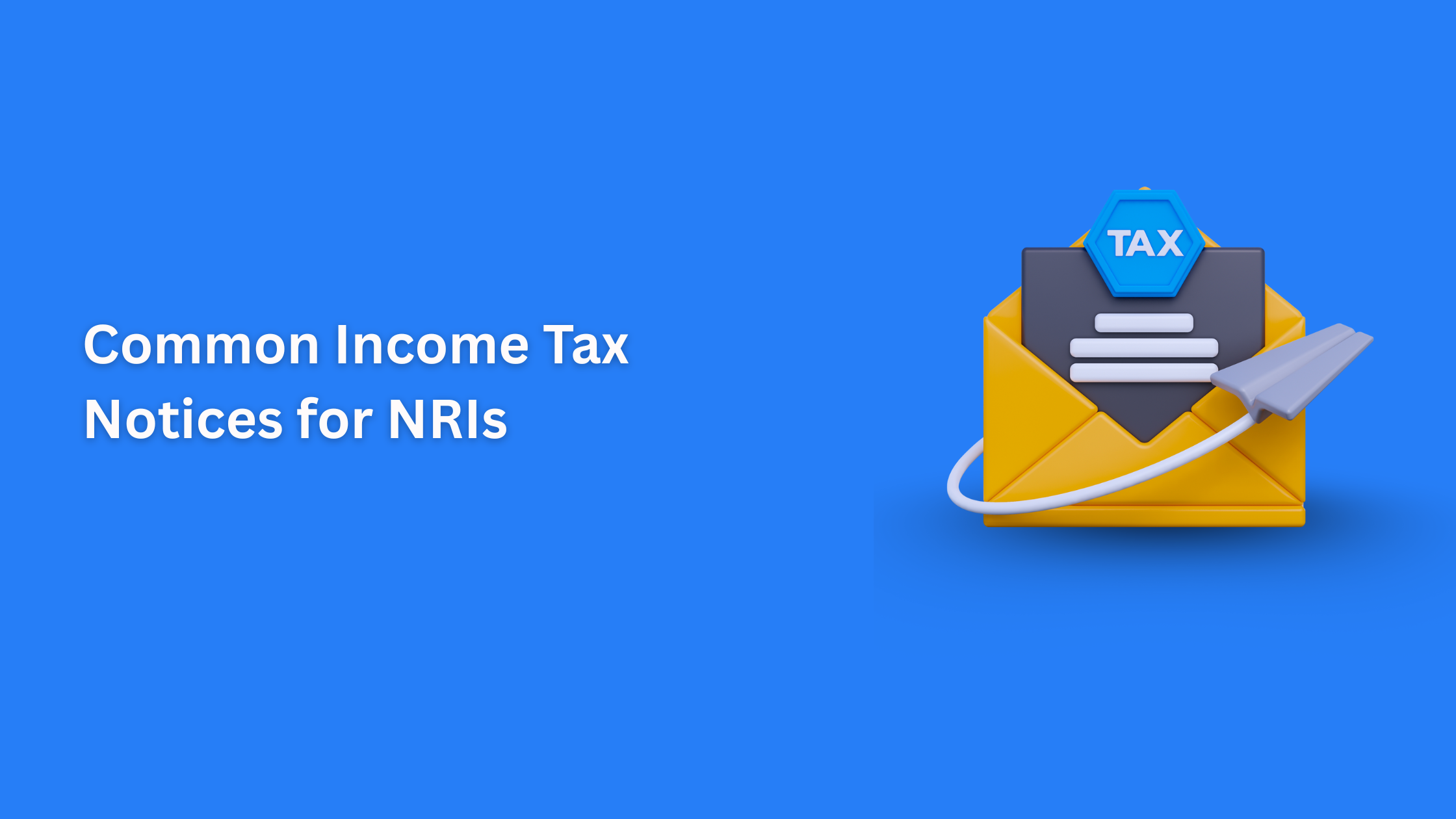Navigating tax compliance can be challenging for many Non-Resident Indians (NRIs), especially when it comes to addressing NRI income tax notices. Many NRIs receive unexpected income tax notices caused by filing errors, unreported income, or mismatched TDS payments. While these notices can be confusing and time-consuming, gaining a clear understanding of them can help you prevent common mistakes and resolve issues efficiently.
This blog explores the most common income tax notices for NRIs, the reasons behind them, and how you can avoid them. We’ll also highlight how timely and accurate tax reporting can save you from potential issues.
Understanding Scrutiny Assessment
When you file your Income Tax Returns (ITR) in India, the Income Tax Department may scrutinize your tax filing to ensure everything is in order. If there are discrepancies between the tax paid and the tax due, the department may issue a notice under Section 143(2) for further investigation. This could involve the submission of supporting documents, books of accounts, and other clarifications regarding your tax filing.
If you owe additional tax, you’ll be required to pay it, or if you are eligible for a refund, it will be processed accordingly.
5 Common Income Tax Notices for NRIs and How to Avoid Them
1. Failure to File Income Tax Return (ITR)
Why This Notice is Issued: If you fail to file your ITR, especially after conducting high-value financial transactions, the Income Tax Department may issue an “e-Campaign – Non-filing of ITR” notice. These notices are typically sent to your registered mail ID and can also be accessed via your e-filing portal under pending actions.
How to Avoid:
- Ensure timely filing of your ITR, as any income earned in India, regardless of the amount, requires tax filing.
- Respond to any e-Campaign notices promptly and submit the required documents to demonstrate the legitimacy of your financial activities.
- If you find the process complex, seek assistance from tax experts like NRI Edge to ensure accurate tax filing.
2. TDS Discrepancy Issues
Why This Notice is Issued: This notice occurs when there is a mismatch between the TDS (Tax Deducted at Source) shown in your ITR and the amount recorded in the TDS Reconciliation Analysis and Correction Enabling System (TRACES).
How to Avoid:
- Verify that the TDS deducted from your income matches the amount listed on Form 26AS.
- If there’s a mismatch, ensure that your employer or the TDS deductor rectifies it by submitting the correct payment to the government and filing a corrected TDS return.
3. Omission of Additional Income
Why This Notice is Issued: If you fail to report all sources of income, including foreign income, or you don’t update your NRI status with the Income Tax Department, the department may issue a notice. The wrong TDS rate might have been applied, and discrepancies in your income reporting could trigger scrutiny.
How to Avoid:
- Log in to the Income Tax e-portal and ensure your NRI status is updated correctly.
- Make sure you report all your income sources, including foreign income, and adjust your TDS accordingly.
4. Unusual or Large Transactions
Why This Notice is Issued: The Income Tax Department’s automated system detects significant, irregular, or high-value transactions that differ from your usual financial activity. This could include large deposits that don’t align with your typical account balance or transaction history.
How to Avoid:
- Notify the Income Tax Department of large transactions and provide explanations where necessary.
- Regularly monitor your bank accounts for unusual transactions and ensure they align with your reported income.
5. Incorrect Income Tax Return Submission
Why This Notice is Issued: If there is an error in the ITR form you filed or if your returns are incomplete or incorrect, the Income Tax Department may issue a notice under Section 139(9) requesting a revised return.
How to Avoid:
- Ensure you fill out the correct ITR form and submit all necessary documents.
- If you find an error in your tax return, file a revised return with accurate information.
- Consult with a tax professional at NRI Edge to avoid mistakes in your tax filing.
Conclusion
Receiving NRI income tax notices can be stressful, but with timely and accurate responses, you can resolve issues efficiently and stay compliant. By staying on top of the common reasons for tax notices and responding in a timely manner, you can avoid complications and ensure a smooth tax filing experience.
For assistance with tax filing and to avoid potential notices, NRI Edge can help guide you through the process, ensuring that all your tax filings are compliant and accurate. Our team of tax experts can provide personalized advice to optimize your tax situation and help you manage your finances efficiently.
Frequently Asked Questions (FAQs)
Q1. What is an income tax notice for NRIs?
As an NRI, if you engage in financial transactions, especially high-value ones, the Indian tax department may take notice. If you fail to file your tax returns or if there are discrepancies in your filings, the Income Tax Department may issue a notice seeking clarification regarding the transactions.
Q2. How can I check if I’ve received an income tax notice?
You can check your registered email inbox for any notices from the Income Tax Department. Alternatively, log in to the Income Tax e-portal and check the “Pending Actions” section on your dashboard under the “e-compliance” tab to see if there are any notices.
Q3. What should I do if I receive an income tax notice for my NRE account or FD?
If you receive a tax notice regarding interest earned on your NRE FD, ensure that NRE FD income is reported as exempt in your income tax return so that the tax department is aware of it.
Q4. Can I ignore an income tax notice?
No, ignoring an income tax notice can lead to severe consequences. The tax department may impose penalties for non-compliance, and prolonged neglect may result in additional fines.
Q5. How should I respond to an income tax notice?
First, carefully read the notice to understand the issue. If you’re able to interpret it correctly, you can directly contact the Assessing Officer (AO) or the relevant authority with your explanation. If you find it challenging, it’s advisable to consult with a tax professional experienced in NRI taxation.






